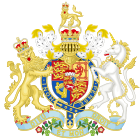The Yeomanry (Ireland) Act 1802 (42 Geo. 3. c. 68) was an Act of Parliament of the United Kingdom affecting the Yeomanry and Volunteers, two of the forces raised in the United Kingdom for home defence. It only covered units in Ireland, with those in England, Wales, and Scotland provided for by the Yeomanry and Volunteers Act 1802.
| Act of Parliament | |
 | |
| Citation | 42 Geo. 3. c. 68 |
|---|---|
| Territorial extent | Ireland |
| Other legislation | |
| Repealed by | Territorial Army and Militia Act 1921 |
Status: Repealed | |
The various units of Yeomanry and Volunteers had been raised during the French Revolutionary Wars, but were only meant to serve during wartime. With the Treaty of Amiens in March 1802, the legal basis for maintaining these forces had disappeared. The Act allowed these corps to continue in service during peacetime on a voluntary basis.[2]
The Act provided that when units were on exercise (up to two days per month), the Government would provide pay, clothing, and weapons, and each troop was allowed one permanent paid sergeant. However, unlike the English act, the units would not be subject to military duty or discipline. As the militia ballot was hardly ever used in Ireland, the act did not provide any formal exemption for volunteers.[2]
Notes
edit- ^ The citation of this Act by this short title was authorised by the Short Titles Act 1896, section 1 and the first schedule. Due to the repeal of those provisions it is now authorised by section 19(2) of the Interpretation Act 1978.
- ^ a b Fortescue, John (1909). The county lieutenancies and the army, 1803-1814. London: Macmillan and Co.